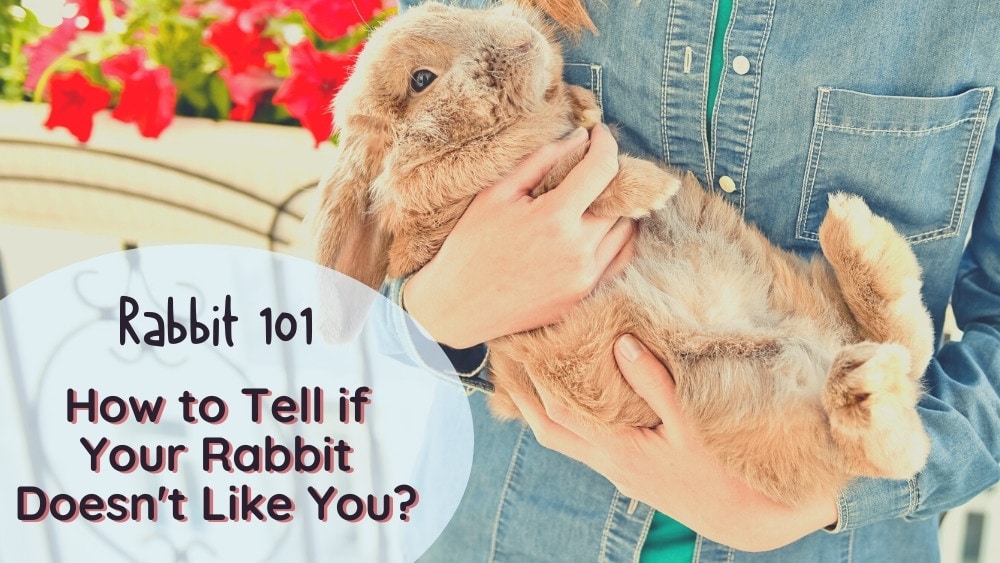Does my rabbit hate me?
I think 95% of rabbit owners have this thought at some point.
There will be times in your relationship with your bunny when it feels like your rabbit is upset with you. Your rabbit may run away from you, or refuse to come out of its cage, or even grunt and nip at you.
Does this behavior mean your rabbit doesn’t like you? Did you do something to offend your rabbit? Or is your bunny simply communicating that he’s stressed and needs some personal space?
In this article, we’ll answer the above questions and explore the following topics:
- Negative Body Language in Rabbits
- Signs Your Rabbit is Upset
- What To Do if Your Rabbit Dislikes You
- What a Healthy Rabbit-Human Relationship Looks Like
- How to Make Your Rabbit Love You Again
How to Tell if Your Rabbit Doesn’t Like You
A rabbit communicates that it’s unhappy with you by refusing to leave its cage, thumping, grunting, boxing, biting, or running away while flicking its feet.
In most cases, this doesn’t actually mean your rabbit dislikes you. It’s more likely to mean it’s stressed and needs your help to feel safe.
6 Signs Your Rabbit is Upset with You
Studying bunny body language will help you develop a healthy relationship with your pet.
Let’s take a look at some gestures that rabbits use to communicate negative feelings and discuss what these actions mean.
1 – Refuses to Leave the Cage or Corner
When a rabbit moves to a new home, he’ll usually pick an enclosed corner of his habitat as his safe haven. Moving is very stressful for rabbits, and it may be days or even weeks before your new bunny wants to venture far from his safe space.
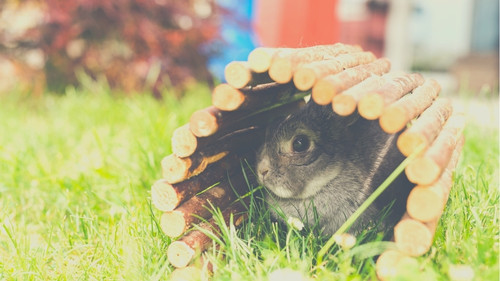
Don’t pull or force your rabbit out of his enclosure before he’s ready. This will only make him cling harder to his cage.
Try leaving your rabbit’s cage door open and leaving the room, giving your rabbit the freedom to explore a safe, bunny-proofed area without feeling like it’s being watched.
2 – Runs Away or Hides When You Enter the Room
Once your rabbit feels comfortable venturing out of the cage when she’s alone in the room, it may still take a while before she’s willing to come out and play while you’re there.
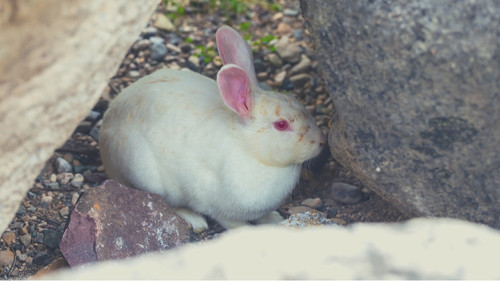
If your rabbit hides when it sees you, don’t be discouraged. Again, the key is to be patient and give your rabbit its space.
Rabbits are very curious. If you don’t try to catch your bunny as soon as she pokes her nose outside of the cage, she’ll learn that it’s safe to come out even when you’re in the room.
3 – Tail and Feet Flicking
Once you’ve developed a bond with your rabbit, he may flick his feet at you if he gets upset about something. This is more an expression of annoyance than of fear.
You might be playing with your rabbit and accidentally offend him, or scold him for getting into something he shouldn’t. Then he’ll run back to his cage while shaking his tail and flicking his hind feet at you in disgust.
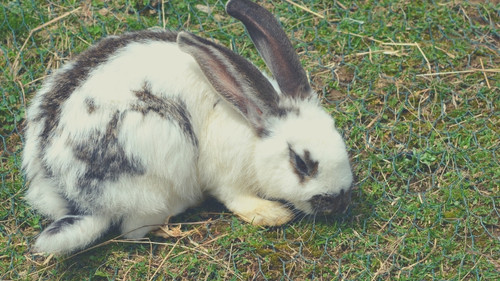
Feet flicking clearly means, “How dare you tell me I can’t chew on the sofa cushions!”
This is one of the few true signs that your rabbit doesn’t like you at the moment. And, because the displeasure is temporary, feet flicking is honestly more cute than offensive.
4 – Thumping
Rabbits thump with their large back feet when they are frightened. Their hind legs are incredibly strong, and thumping makes a tremendous noise. Rabbits might do it once, or they might do it multiple times if the perceived threat remains.
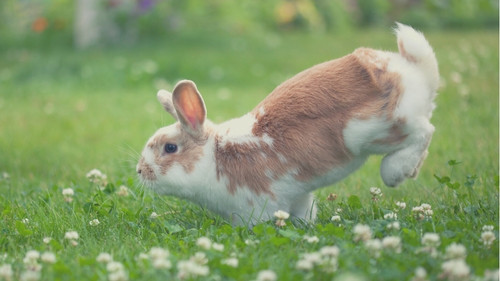
When I hear thumping, I try to determine the source of the threat. Is the family dog nearby? Is there a strange smell or noise? Or did a hawk fly by the window? Remove the threat if you can, but don’t try to pick your rabbit up when it is alarmed.
5 – Grunting or Growling
Adult rabbits are usually silent, and only vocalize if they are upset. Grunting or growling usually signals that a rabbit is so frightened that it feels the need to defend itself.
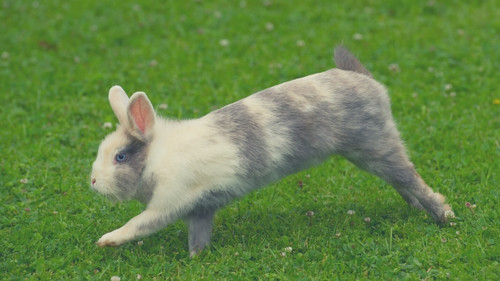
Grunting can be aggressive behavior, especially if a rabbit bares its teeth and flattens its ears while growling.
6 – Lunging, Boxing, and Biting
In most situations, a rabbit’s first line of defense is to run away. But if something is invading a bunny’s space and running isn’t an option, rabbits aren’t afraid to fight.
This is why it’s so important to respect your rabbit’s safe space, and not try to reach into his cage.
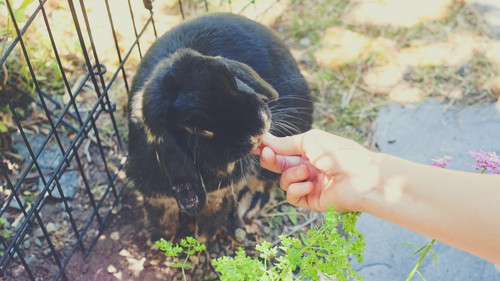
If you place your hand in your rabbit’s cage when it’s not welcome, your bunny may lunge at you, rear up and box you with its front claws, or sink its teeth into your wrist.
Thankfully, if you respect your rabbit’s space, then lunging, boxing, and biting are not very common rabbit behaviors. I think it’s safe to say that most rabbits –especially neutered rabbits – never bite people.
What Should You Do If Your Rabbit Dislikes You?
If your bunny displays one of the negative behaviors listed above, the first thing you should do is figure out what caused your rabbit stress.
Rabbits are generally timid creatures, and won’t thump, growl, or bite unless they are terrified and feel the need to go on the offensive.
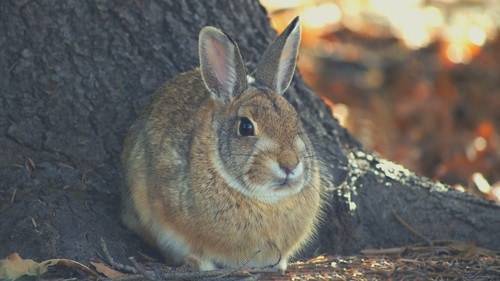
In most cases, the stress trigger is a new sound, smell, or change in environment. Change of all kinds is incredibly stressful for rabbits.
If you recently adopted your rabbit, don’t be discouraged if it seems like your bunny doesn’t like you. Give him a quiet environment and the space to explore on his own terms.
If you prove trustworthy and safe, and provide him with good things, he’ll quickly learn to like you.
What Can Make a Rabbit Start Disliking You?
It’s normal for a new rabbit to avoid people while he settles in. But if you’ve had your rabbit for a while and already become friends, the reason why your rabbit suddenly starts disliking you could be more concerning. Here are some reasons why a rabbit might suddenly dislike you:
- Illness. Rabbits try to hide it when they aren’t feeling well. If your rabbit is suddenly avoiding you, watch him carefully for signs of illness.
- Predators or other threats. Did the cat sneak into the rabbit room? Are there loud noises on the street? Anything that threatens a rabbit may make him seek his personal space.
- Strange smells. Did you bring home the smell of a dog on your clothes? Is the smell of grilled meat wafting in through the window? I’ve seen both of these things upset rabbits.
- Caught being naughty. If your bunny is misbehaving and you catch him, he may be temporarily upset with you. Treat him gently. Never hit your rabbit, even when his behavior needs correction. Any aggressive action on your part will make your rabbit fear you, and spoil your chances of a good relationship.
If your rabbit is getting into trouble, clap your hands and say “no!” firmly but without shouting. This will probably make your bunny sheepishly retreat to his cage, flicking his feet behind him.
What Does a Healthy Relationship with a Pet Rabbit Look Like?
The rabbit is a unique creature. Rabbits are very relationally aware– more so than a hamster or chinchilla – but a bunny is also a prey animal, unlike a dog or cat.
Rabbits can develop complex personalities and display a range of emotions when they feel safe. But they quickly revert into a protective, closed-off state when they are threatened.
The key to a healthy relationship with your rabbit is to help him feel safe at all times. To do this, you’ll have to relate to your bunny on his own terms.
For example, most rabbits don’t like to be picked up and held. In the wild, if a rabbit is scooped off the ground, it’s most likely about to become dinner! Rabbits hate to be chased for the same reason. Cuddles and games that your cat may enjoy might terrify your bunny.
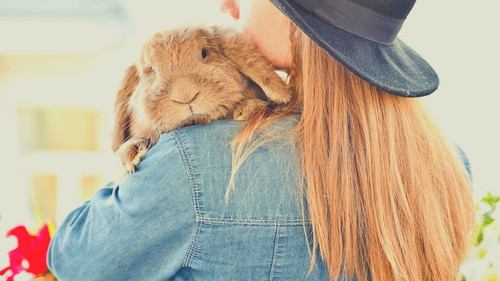
As your rabbit grows more comfortable with you, he may start to enjoy being picked up or snuggled. But some rabbits never get to this point, but will enjoy playing and relating in other ways.
As you develop the bond with your bunny, stop and marvel at the fact that a prey animal like a rabbit, and an apex predator, a human, can form a friendship at all.
How to Make Your Rabbit Love You Again
If you feel like you’ve upset your rabbit, or if you’re trying to build a bond with your bunny in the first place, follow these steps:
1 – Create an Enriching Habitat
Give your rabbit’s creativity a chance to develop by designing a habitat full of enriching activities.
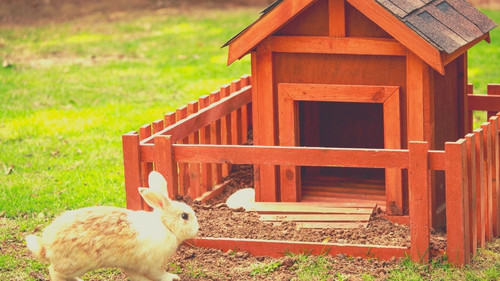
Add toys, tunnels, or digging stations to your rabbit’s play area. This will encourage him to explore the world beyond his cage.
2 – Be a Non-Threatening Presence
Talk softly to your rabbit. You don’t need to be silent. Use soothing, murmuring sounds as you talk to your bunny to encourage her that you’re a friend.
Keep other noises to a minimum while you’re bonding with your bunny. Turn off the television and keep children away from a rabbit who is adjusting to a new space.
3 – Let the Rabbit Approach You
Sit on the floor in your rabbit’s habitat and let your bunny come to you when it’s ready.
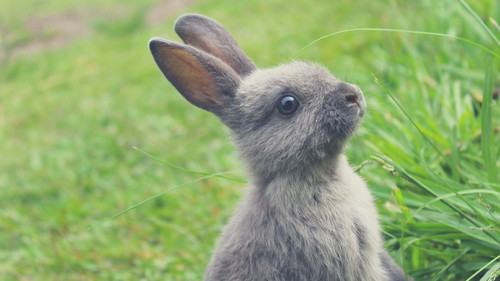
Don’t reach for your rabbit, chase him, or corner him. Rabbits love to investigate. In time, your bunny will come over to sniff, nuzzle, or nibble your shoes, clothes, and hands.
4 – Give Treats for Positive Reinforcement
When your bunny does come over to visit you, reward its curiosity with a treat. Offer a blueberry or small, healthy treat in your outstretched palm.
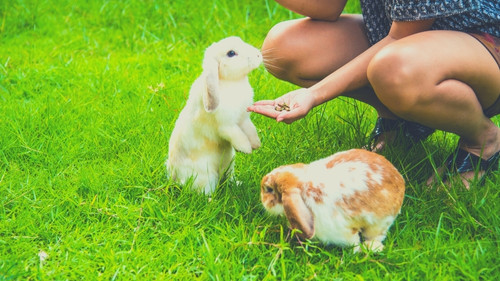
If your rabbit isn’t comfortable with that, set the treat on the floor next to you. In time, this positive reinforcement will build trust with your rabbit.
5 – Pet Your Rabbit the Right Way
For some rabbits, petting can be as effective a reward as a treat. To ask if your rabbit would like to be pet, let your bunny sniff your open hand. If it doesn’t shy away, you can scratch your rabbit’s forehead, letting the bunny smell your arm at the same time.
If the rabbit seems to enjoy this, you can continue to stroke its head, ears, back, and body.
Don’t try to touch its feet, tail, or tummy! Rabbits actually consider their tummies vulnerable and don’t like them touched.
Final Thoughts
A good relationship with a pet rabbit looks different from a relationship with a dog or any other animal. If you are concerned that your rabbit doesn’t like you, make sure you aren’t importing unrealistic expectations to your relationship with your rabbit based on experiences you’ve had with other pets.
Most rabbits will warm up and develop a bond with their human companions over time. Be a calm, gentle, and giving presence in your rabbit’s life. Read your rabbit’s body language, so you can tell when it is stressed or displeased and adjust your actions as needed. It probably won’t be long before you have a lifelong bunny buddy.
How does your rabbit express displeasure or frustration? Let us know in the comments if this post was helpful or if you have any other questions!


